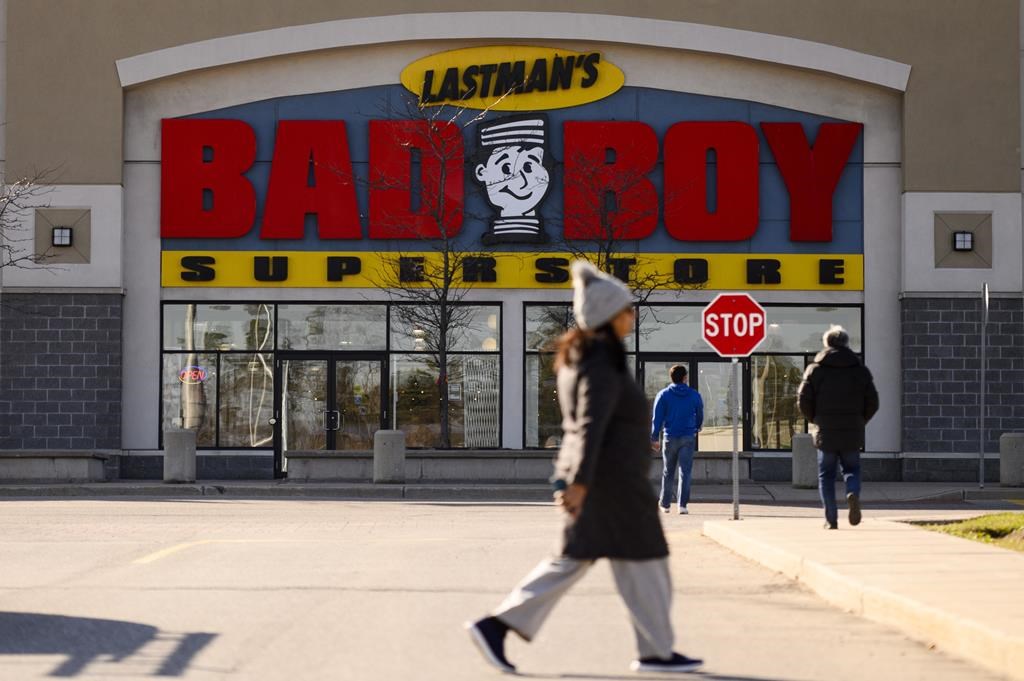TORONTO — A storied Greater Toronto Area furniture brand founded by a former city mayor and popularized with television and radio ads proclaiming “nooobody” could beat its prices is aiming to restructure its business.
In a filing made under the Bankruptcy and Insolvency Act last week, Bad Boy Furniture Warehouse Ltd. said a slew of economic conditions that have weighed on consumers’ shopping habits and its business forced it to make the “very difficult decision” to re-examine its operations.
“The decision to commence these proceedings was taken after much deliberation,” the furniture company said in a notice to customers presented to an Ontario court Thursday as part of a broader Notice of Intention, a legal mechanism companies use to right their business following troubles.
“Bad Boy believed (the notice) was necessary in the context of a challenging economic environment driven by high interest rates, declining sales in the housing sector and a tight retail climate, particularly in the home furnishing sector.”
The filing marks a significant turn in the history of the company started by entrepreneur Mel Lastman, who dropped out of school to work at an appliance store before opening his own on Weston Road in Toronto in 1955.
Lastman went on to become the mayor of North York, a suburban region of Toronto, and later, the first mayor of the newly amalgamated City of Toronto.
By 1975, he sold the business. The Globe and Mail reported a consortium of buyers it did not name purchased the business for $2 million. Shortly after, the company filed for bankruptcy.
Mel Lastman’s son Blayne revived Bad Boy in the early nineties and these days, the Pickering, Ont.-headquartered retailer is wholly owned by him under Lastman Furniture Inc.
Blayne Lastman and his father, who died in 2021 at age 88, routinely appeared in ads together that blanketed Toronto television and radio stations. They were often clad in black and white jailhouse uniforms and shouting, “Who’s better than Bad Boy? Nooobody.”
These days, the chain has 12 stores throughout southern Ontario and 275 employees.
Bad Boy’s Superior Court of Justice filings show it has about $25 million in assets, including inventory and store fixtures and roughly $26 million in liabilities.
The parent company owes many of its vendors, including most of its appliance and furniture suppliers.
Its debts owed to unsecured creditors total $13.7 million and include $2.3 million to Whirlpool Canada LP, $840,924 to Samsung Appliances, $404,410 to LG Electronics Canada Inc. and $317,382 to RioCan Real Estate Investment Trust.
As a result, Bad Boy is facing “significant” challenges sourcing inventory and filings show some real estate developers have purportedly terminated their contracts with the company.
To keep the business afloat, Bad Boy is considering a liquidation sale at some or all of its stores to wind down inefficient portions of its business.
It also urged customers who have paid a collective $4.5 million in deposits for furniture that has yet to be delivered to contact their credit card company to obtain a refund.
Where possible, the company said it will work with customers to complete orders, if the cost of the merchandise is less than the balance owing, or if other arrangements can be made with the customer.
Bad Boy’s court filing didn’t take Joanne McNeish, a Toronto Metropolitan University associate professor specializing in marketing, by surprise.
Emerging from COVID-19 restrictions, she said many people weren’t searching for furniture because they had already redesigned their homes or bought essential pieces during the pandemic.
Recession predictions kept others away from furniture purchases too.
“The discretionary things like ‘I’m really tired of the way my living room set looks,’ during an economic recession, we put that purchase off until we feel more confident about the economy,” McNeish said.
She also thought Bad Boy’s advertising wasn’t as effective at attracting sales from a new generation, which likely saw the company’s marketing efforts as dated and were drawn to rivals like Ikea, the Swedish furniture giant which offers even lower prices.
Local television and radio stations along with newspapers will have a revenue hole to fill because Bad Boy was a steady advertiser, but McNeish said it had already pared back on its advertising efforts in recent years.
At this point, she believes the best way forward for the brand is to sell off assets like any real estate Bad Boy owns.
“I always hate to see a company go into bankruptcy and that is sort of protection for restructuring,” she said.
“But they’ve already done things that will alienate customers for years to come.”
This report by The Canadian Press was first published Nov. 13, 2023.



